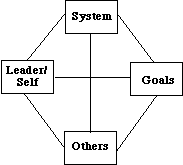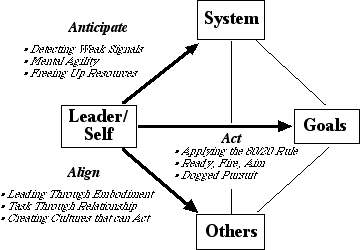Alpha Leadership
by Robert Dilts
Alpha Leadership is a new model of leadership whose purpose is to capture and share the latest and most up-to-date knowledge about the practice of effective leadership. The model arose as a result of a series of passionate and in-depth conversations and discussions about effective leadership between myself, Anne Deering (a top consultant for A.T. Kearney) and fellow NLP trainer and coach Julian Russel (founder of PPD Consulting). The Alpha Leadership model defines a set of principles, tools and skills modeled from observing and coaching world-class leaders from around the world.
Prior to the early 1980s, leadership development in organizations primarily focused on different leadership styles. These styles were most evident in the relationship between leaders and co-workers. Leadership emphasized the characteristics and “rules” for expressing an effective leadership style with respect to a particular situation. It was noticed, for instance, that winning leaders were able to strike a balance between attention to tasks or goals and attention to relationships with team members; a balance that needed to be constantly adapted to specific situations.
The mid 1980s saw a shift in focus from “transactional” to “transformational” leadership, spearheaded by the work of Bernard Bass. In the transformational model, effective leadership was no longer a function of simply adjusting one’s style and actions to a particular situation in order to get someone to efficiently accomplish a specific task, but rather to promote the expression of each individual’s potential (helping him or her to perform “beyond” expected outcomes). Transformational leadership focused on four key additional elements:
1. Vision
2. Change management
3. Motivation to continuous improvement
4. The key role of trust in promoting true team spirit
The last decade has seen an extension of transformational leadership through the skills of visionary leadership and meta leadership (leading and developing other leaders). This has led to the emergence of other leadership abilities in relationship to:
• Promoting Change
• Realizing Core Values
• Recognizing the Potential of Each Individual
• Developing and Empowering People
Thus, in the emerging views of leadership leaders do not have influence simply because they are ‘bosses’ or ‘commanders’. Rather, leaders are people who are committed to “creating a world to which people want to belong.” This commitment demands a special set of models and abilities in order to effectively and ecologically manifest the visions that guide those committed to change. It involves communicating, interacting and managing relationships within an organization, network or social system to move toward one’s highest aspirations.
Alpha Leadership represents the leading edge of these developments.
The term “alpha,” which comes from the first letter of the Greek alphabet, means “something that is first,” or “the beginning.” In fact, it is interesting to note that “leading” and “leadership” come from the Old English word lithan (one of the rare English words that actually has an English origin), which literally means “to go.” According to Merriam-Webster’s Dictionary, leadership means “to guide on a way, especially by going in advance.” It is significant that the root of the word leadership does not have to do with “power,” “command,” “dominance,” etc. It has to do with going somewhere together with others. It is not so much about “being number one” as it is about “leading the way” through one’s own actions.
Thus, in its truest expression, leadership is fundamentally about “going first,” and influencing others as much by one’s actions as by one’s words. From this perspective, effective leadership can be viewed as the ability to involve others in the process of accomplishing a goal within some larger system or environment. That is, a leader leads or influences a collaborator or group of co-workers towards achieving some end in the context of an organization, social community and environment.

Leaders Involve and Influence Others in Order to Achieve Goals Within a System
The Alpha Leadership model addresses each of these key elements, which make up the “work space” of leadership, through what we refer to as the “triple As” of leadership: Anticipate, Align and Act.
Anticipating has to do with the leader’s ability to be aware of the larger system in which he or she and the team or organization are acting.
Aligning has to do with the way a leader engages and interacts with others—achieving congruence in his or her own values and desires, and the values and desires of others in order to act effectively in pursuit of business goals and outcomes.
Acting relates to establishing what is important to achieve the business goals, and making the commitment to persist in areas that make a difference through clarity and constancy of purpose.

The Alpha Leadership Model
Each of these key aspects of leadership is supported by three core skills necessary to bring them into action.
Anticipate
• Detecting Weak Signals: Similar to the sonar system of a bat, leaders and organizations need to be able to sense and interpret subtle cues, in order to become aware of trends and patterns in the larger system, even before they happen.
• Mental Agility: Having the flexibility (or “requisite variety”) to respond appropriately to these signals.
• Freeing Up Resources: Creating organizations fluid enough to respond quickly to new circumstances.
Align
• Leading Through Embodiment: Developing personal power through congruence and personal alignment, and being aware of one’s impact on others.
• Task Through Relationship: Establishing cooperation and rapport and encouraging self-organization through meta leadership.
• Creating Cultures that Can Act: Establishing the conditions in which others can win.
Act
• The 80/20 Rule: Being efficient, and finding the key leverage points for effective action— “knowing where to tap.”
• Ready, Fire, Aim: Being proactive and at the same time sensitive to feedback in order to make “in-course” corrections.
• Dogged Pursuit: Focusing and stretching business goals, being clear about how the business creates value, and having a strong sense of connection between one’s personal mission and business role.

Alpha Leadership Principles, Skills and Tools Support Effective Interactions Between Leaders, Co-workers, Business Goals and the Larger System in Which They Are Acting.
The Alpha Leadership model supplies tools for managers, consultants and coaches to develop more effective leadership ability in themselves and others. While the focus of Alpha Leadership is necessarily on business, the principles, skills and tools can be applied in other contexts in which we want to improve our performance or results.
The book on Alpha Leadership is available here.
Robert's Alpha Leader DVD is
available here.



